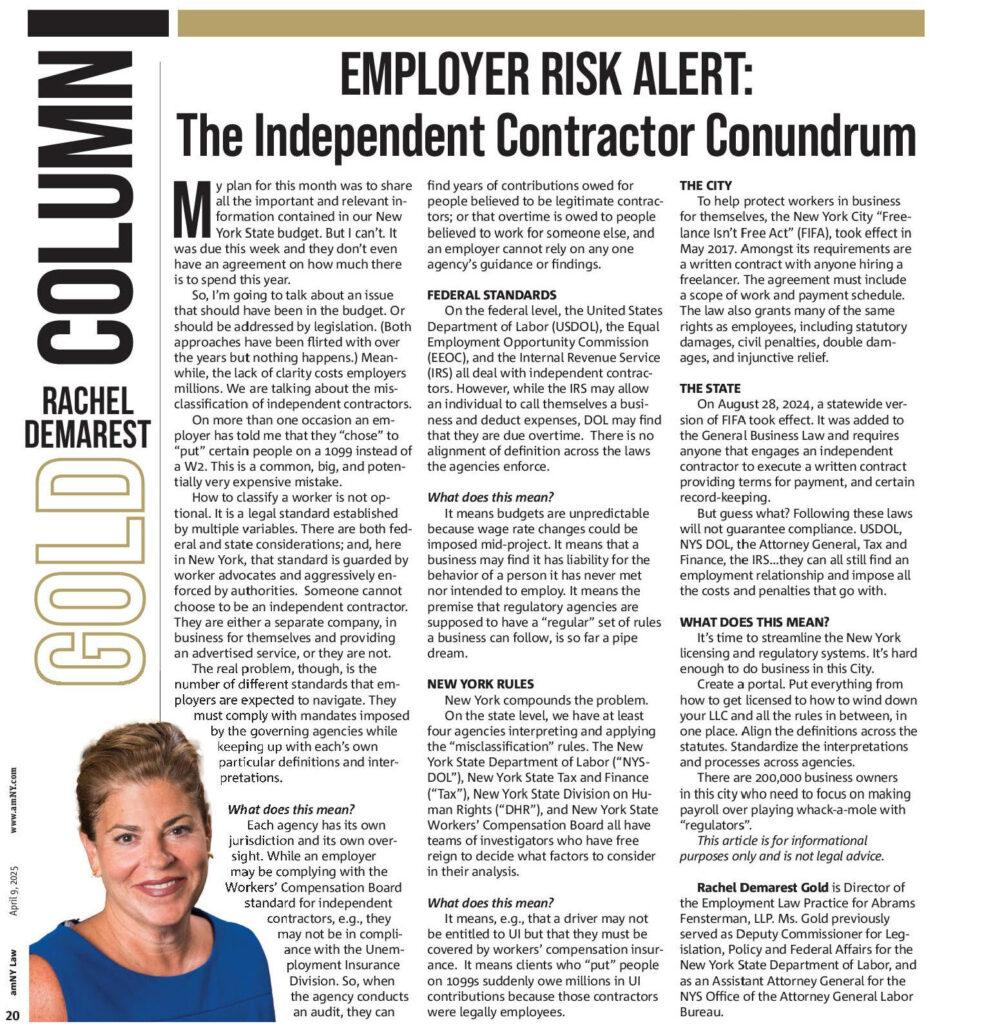By Carolyn Wolf
When Adult Children Need Lifelong Support and Supervision
You are in a diner, and at the next table is an elderly man feeding his middle-aged son, who is in a wheelchair. A neighbor, spry into her 80s, puts her 50-year-old daughter on a bus every morning, to travel to an adult day care. The woman upstairs has taken to sitting in the building lobby, asking questions of tenants as they go in and out; clearly she has stopped bathing. Her parents come by every day to try to coax her back upstairs.
As the population ages, concerns mount regarding the future of adult children with serious mental illness and/ or other related incapacities, who will continue to require financial oversight and medical/mental health interventions and planning. Parents of adult children who require lifelong support come from all socio-economic levels and professional practice and cultural backgrounds, including fellow attorneys and judges.
According to a recent study published by MetLife, over 44 million Americans, an estimated 21% of all U.S. households, provide care for an adult family member or friend age 18 or older; 79% of these family caregivers provide care to someone over the age of 50. 1 Many caregivers are aging themselves; and many have been the primary caregivers of their adult children for the entirety or greater portion of their own adulthood. Few, if any, have the training and experience to address the mental health care needs of their now-adult children.
With severe budget cuts looming and the shortfall of appropriate clinical outpatient programs, residential housing, vocational programs and support services, many aging and elderly parents care for their dependent adult children at home without the necessary financial and emotional support. The thought of planning for the future is overwhelming; rather than plan, some parents hope that someone or some agency will miraculously take over in a seamless and efficient manner.
For these aging parents the main issue is who will direct medical and mental health care and the financial oversight of their child when they are incapacitated or gone. Concerns include, but are not limited to, the following: (1) Who will care for my child when I am gone? (2) Where will my child live? (3) Who will make certain that my child receives proper medical/mental health treatment? (4) Who will manage my child’s care? (5) Will there be enough money to provide for a good quality of life for my child?
The Case Consultation
Consultations with these clients involve an in-depth discussion of the history and up-to-date details of the loved one’s living, clinical and legal situations and the current status of any provisions made for the adult child’s care. These aging parents fear the loss of control and that as a result their adult child will be left alone, homeless, untreated and uncared for once they are incapacitated or gone. It is a significant balancing act to address and then execute a plan that satisfies all their fears and concerns. Sometimes these issues can be
Over 44 million Americans, an estimated 21% of all U.S. households,
provide care for an adult family member or friend age 18 or older;
79% of these family caregivers provide care to someone over the age of 50.
addressed by the legal system, sometimes not; often it takes a great deal of creativity to formulate a workable plan. In every situation, a team of individuals must be assembled and involved to effectuate such a plan. The team should include family members, clinical experts, future care/advocacy organizations, a financial planner or an insurance agent, attorneys with the appropriate mental health or elder law expertise, accountants and, quite often, the adult child.
Who Can Legally Stand in the Shoes of the Aging Parent(s) when the Time Comes?
While it may be impossible to identify someone who has the same level of commitment as a parent, the law does provide several avenues by which others can make appropriate medical and mental health-related decisions for the adult child with a mental illness or developmental disability. Individuals with a mental illness or developmental disability who are over 18 and have the mental capacity can sign a health care proxy and appoint a health care agent for themselves. First, the attorney advising the family should evaluate specifically the adult child’s capacity to execute such a document. It is important to explain the purpose of this document and to impress upon the adult child the importance of making his or her wishes known to the person who is appointed as agent and the successor agent, if there is one. Knowing that someone will be ready, willing and able to act in their stead should the adult child be unable to decide about medical or mental health issues, may bring comfort to the parents.
In the event an individual with a mental illness or developmental disability lacks the capacity to appoint a health care agent, the newly enacted Family Health Care Decisions Act (FHCDA) 2 allows for a surrogate decision maker to decide on a proposed treatment or to withhold or withdraw treatment under specific circumstances and when the patient is in a hospital or residential health care facility. The law creates a hierarchy of decision makers, including a spouse or domestic partner, a son or daughter over the age of 18, a parent, a sibling over the age of 18 or a close friend. The FHCDA fills in the gap between those who have not appointed a health care agent and where “clear and convincing evidence” of a person’s wishes are unknown or could never have been known. Living wills and do not resuscitate orders are also legal alternatives available to individuals when end-of-life decisions are required to be made, in the absence of a health care proxy.
When discussing mental health decision-making alternatives with an aging parent-client, it is important to point out that neither a health care agent nor a surrogate under the FHCDA may involuntarily commit a person or override the person’s objection to treatment on an inpatient psychiatric unit. The New York State Mental Hygiene Law and its concomitant regulations, however, provide for these decisions to be made for the incapacitated individual in this situation.
When addressing the financial management and oversight of an adult child with a mental illness or developmental disability, an aging parent may want to consider offering the adult child, if he or she has the requisite capacity, the opportunity to execute a power of attorney. Unlike a health care proxy, which goes into effect only when the person loses capacity to make health care decisions, a power of attorney authorizes the agent, previously called the “attorney-in-fact,” to make financial decisions either while the person has capacity but chooses not to act or loses capacity to make financial decisions. A power of attorney can be as broad or narrow as the individual would like, authorizing the agent to make all or only specific financial decisions. When advising an aging parent, it is essential to carefully explain the benefits and drawbacks of a power of attorney, such as the individual’s ability to revoke it at any time. The parent must understand that this document can be withdrawn at the whim or misunderstanding of their adult child.
Another option, which is vitally important in protecting access to government benefits, is the creation of a supplemental needs trust (SNT). If properly drafted, any assets placed in this type of trust should not affect an individual’s eligibility for Medicaid or other public benefits such as Supplemental Security Income (SSI) so long as the money is used solely for the benefit of the person for whom the trust is created and is used to “supplement” not “supplant” or replace government benefits. This type of trust can be created for anyone who has a severe and long-term disability even if the individual is not presently receiving government benefits. The advisor should evaluate as soon as possible whether the family could and should set up an SNT, taking into account life-time care needs going forward and extending into the period of the aging parent’s incapacity or death.
Depending upon the situation at hand, a variety of supplemental needs trusts are available to protect government benefits: e.g., pooled trusts, 3 self-funded trusts 4 and third party funded trusts. 5 Such trusts may be used as part of a well-drafted estate plan. Aging parents of adult children with special needs or limitations should consider these options. Additionally, those parents with sizable assets may consider the variety of irrevocable trust options available.
Many aging parents of an adult child with a mental illness or developmental disability do not realize that every young person, regardless of the disability, becomes an emancipated adult at age 18 in the State of New York, so another legally available option to consider is guardianship. Deciding whether an individual requires the appointment of a guardian, and who will serve in that capacity is an important part of life planning for children with disabilities. Aging parents in this situation need to consider who will be best suited to act as a guardian. New York State has two types of guardianships that parents can seek for an adult child with a mental illness or developmental disability. Article 81 of the Mental Hygiene Law allows for a tailored guardianship and is the least restrictive alternative. Article 17-A of the Surrogate’s Court Procedure Act is usually a plenary guardianship and most suitable for adult children with developmental disabilities or mental retardation. A guardian can be empowered to make both health care and financial management decisions for an individual deemed to lack decisional capacity, whether due to a developmental disability, mental illness, serious substance abuse diagnosis or related psychological disorders. Petitioning for guardianship allows families, particularly parents, to choose exactly whom they believe will make the best decisions for their loved one, act in the adult child’s best interest and have the protection of a court-overseen process to avoid anyone taking advantage of the adult child. The guardianship can be court ordered to include a successor guardian as well which can make aging parents feel confident that their adult child will have continuity of care. It is important to note, however, that a guardian under New York law cannot involuntarily commit an individual to a psychiatric hospital nor can the guardian override a refusal of treatment when the individual is on an inpatient psychiatric unit of a hospital.
It is Always Better to Plan Ahead
Many of the clients who seek advice about their adult child come in “crisis mode.” They have not planned, and now they face a situation which requires immediate legal and/or clinical interventions. Among the alternatives – and they are very limited in scope – is the mental health warrant, 6 involuntary inpatient hospital commitment 7 and, when appropriate, assisted outpatient treatment ( Kendra’s Law). 8 Professional support services may also include psychiatric case managers, care coaches, geriatric care managers, intensive care managers or ACT Teams. There are generally a finite range of legal options, but a myriad of clinical options, which need to be consolidated and coordinated.
Although crisis mode can be managed it is always better to plan ahead. A proactive rather than reactive approach allows for thoughtful consideration and time to act as well as to try different alternatives. If one approach does not work, switch to another; if that fails, try again. Dealing with mental illness, developmental disabilities, mental retardation and/or serious substance abuse is not an exact science and often changes on a weekly, sometimes daily basis. Just as people age so do the issues inherent in these conditions.
Multiple areas of law may need to be addressed and coordinated: criminal law, landlord-tenant law, employment law, family law, matrimonial law and trusts and estates law. For example, an adult child has decompensated, broken a law and has been arrested. Criminal charges and penalties loom, and the parents must deal with the criminal justice system. Or, the aging parents have set up the adult child with housing and services, which they pay for and oversee. Through a decompensating or a sudden triggering of symptoms, the adult child’s behavior changes; the coop or condo board becomes concerned about the living arrangements and challenges this legally. The parents must now address landlord-tenant and real estate legal issues with which they may be extremely unfamiliar.
Safety and Security
In addition to the medical-legal systems involved in caring for an adult loved one with mental illness, developmental disabilities, mental retardation and related health issues, are safety and security concerns, whether that of the person with the disability, the adult caring for that person, or both. Sometimes this involves bringing in safety and security experts, investigators, former law enforcement specially trained personnel and the like, to ensure the dependent child does not harm himself or herself and/or others.
Other Considerations and Options
The use of a psychiatric case manager or geriatric care manager is another option. These professionals are generally nurses or social workers who are specially trained to assist on a daily basis, 24/7, with the logistics of overseeing the care, interventions or management of an individual with mental illness or developmental disabilities. They are often the most efficient and effective means of monitoring and making active the proposed medical/mental health care plan. They also keep a close eye on the financial management plan to ensure it is in the best interest of the individual and look out for potential financial abuse – and intervene in a timely and appropriate manner. Many organizations as well can assist families with putting in place a long-term care plan to eliminate some of the stress of caring for an adult child with disabilities.
Families of children with disabilities often face decisions regarding appropriate housing for their adult children, post-secondary education, employment, health care and guardianship. Parents can aid in planning for children with disabilities by helping the children learn to self-advocate to the greatest extent their ability. The Individuals with Disabilities Education Improvement Act (IDEIA) 9 protects students with disabilities until the child graduates from high school or reaches the age of 21. After high school, Section 504 of the Rehabilitation Act 10 and the Americans with Disabilities Act 11 protect students with disabilities from discrimination. Parents need to be aware of the protections afforded their children and educate future caregivers of the same.
Parents should remember that students with disabilities are entering college and other post-secondary educational programs in greater and greater numbers. Families may work with a mental health attorney and an educational consultant who can explore higher education options and advise them on appropriate choices for an adult child with special needs. When available, parents should explore educational and vocational options as early as possible to provide these adult children with access to programs and assistance so that they become as self-sufficient as possible.
Where Aging Parents Go from Here
Probably one of the most daunting questions for aging parents is, “Where will my child live after we are gone?” Depending upon the needs of the adult child, parents may consider home placement with care supports, assisted living and group home placement. Parents need to plan early and carefully so that a child with disabilities will be able to access appropriate housing options. In many cases, families will have to take steps to ensure that their adult child is eligible for Supplemental Security Income and Medicaid in order to qualify for housing options, although families may pay privately if significant resources are available. Even when a family can pay for an adult child’s long-term residential placement, however, many programs require that the individual be eligible for SSI and Medicaid to ensure a long-term payment stream. Families may use the tools discussed above to protect their adult child’s access to governmental benefits or private resources and in turn allow them to take advantage of the different housing options available.
Conclusion
Parents of children with disabilities need to plan early to ensure that the care of these adult children is without gaps. Families have more planning choices than ever before. First and foremost, however, aging parents should try to assess their adult child’s long-term needs and seek appropriate advice and counsel to address them. Parents should put together a team to develop a plan which provides oversight and direction for both medical/ mental health and financial concerns. Again, whenever possible, it is important to include the adult child in the conversation and planning. Some may be capable of handling their medical/mental health and/or financial needs, others cannot. Helpful as well for aging parents is seeking out appropriate advocacy organizations and other professionals who are well versed in the nature of the individual’s specific disability. There truly is safety in numbers, and support groups can be of great help and comfort for families experiencing these difficulties and issues. It is also helpful to get referrals to professionals from those who have had a positive experience with them.
Parents of a loved one with disabilities may be consumed with worry about the future of their adult child with special needs, but with proper planning families can help an adult child to develop to full potential while enjoying the quality of life all parents want for their child.
1. National Alliance for Caregiving & AARP, Caregiving in the U.S. 6, 9 (Apr. 2004).
2. (PHL §§ 2994-a-2994-u.
3. 42 U.S.C. § 1396p(d)(4)(c); 18 N.Y.C.R.R. § 360-4.5(b)(5)(b).
4. 42 U.S.C. § 1396p (d)(4)(a).
5. N.Y. Estates, Powers & Trusts Law 7-1.12.
6. MHL § 9.43.
7. MHL § 9.27.
8. MHL § 9.60.
9. Individuals with Disabilities Education Improvement Act of 2004, Pub. L. No. 108-446, 118 Stat. 2647.
10. Section 504 of the Rehabilitation Act of 1973, 29 U.S.C. § 794.
11. Americans with Disabilities Act, 42 U.S.C. § 12101.
Reprinted with permission from: New York State Bar Association Journal, July/August 2011, Vol. 83, No. 6, published by the New York State Bar Association, One Elk Street, Albany, NY 12207





